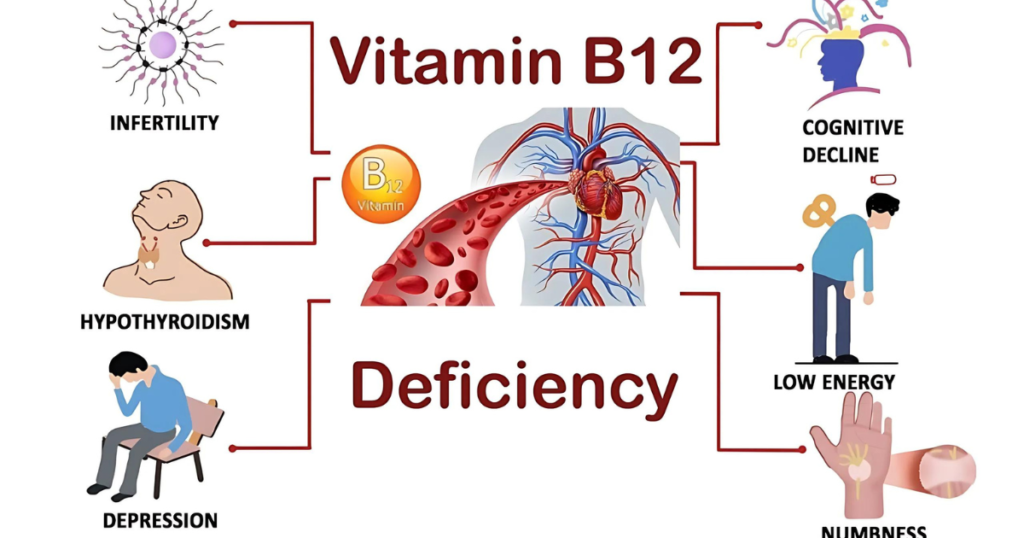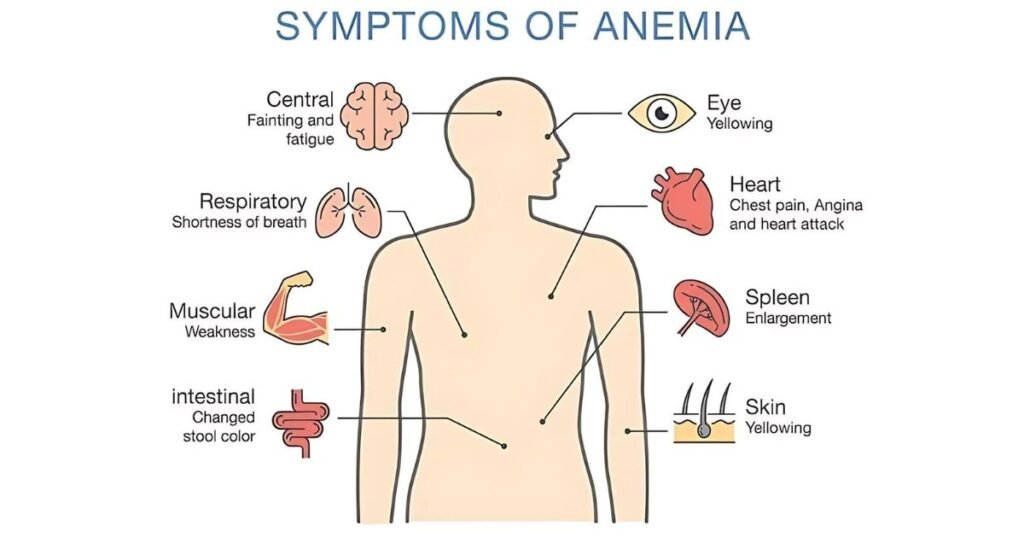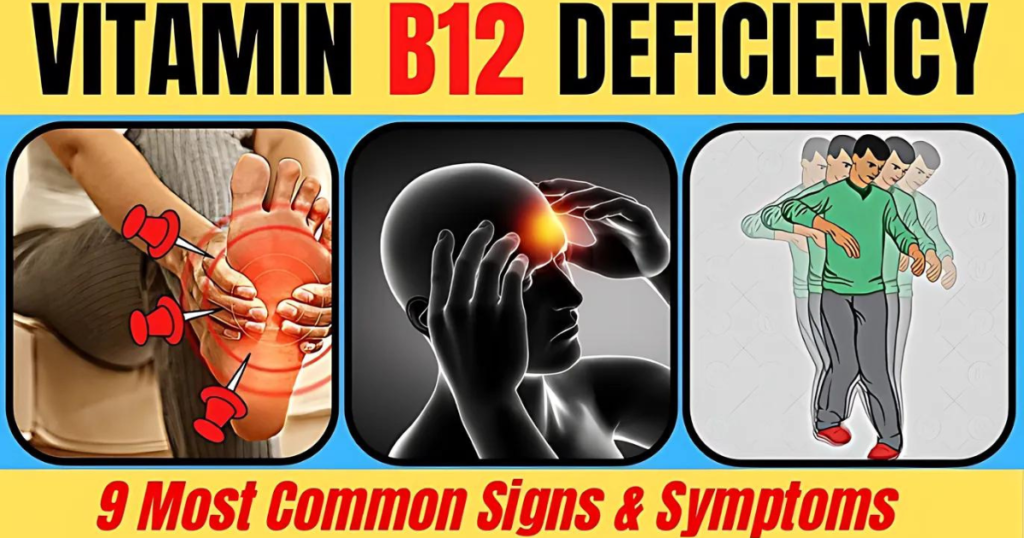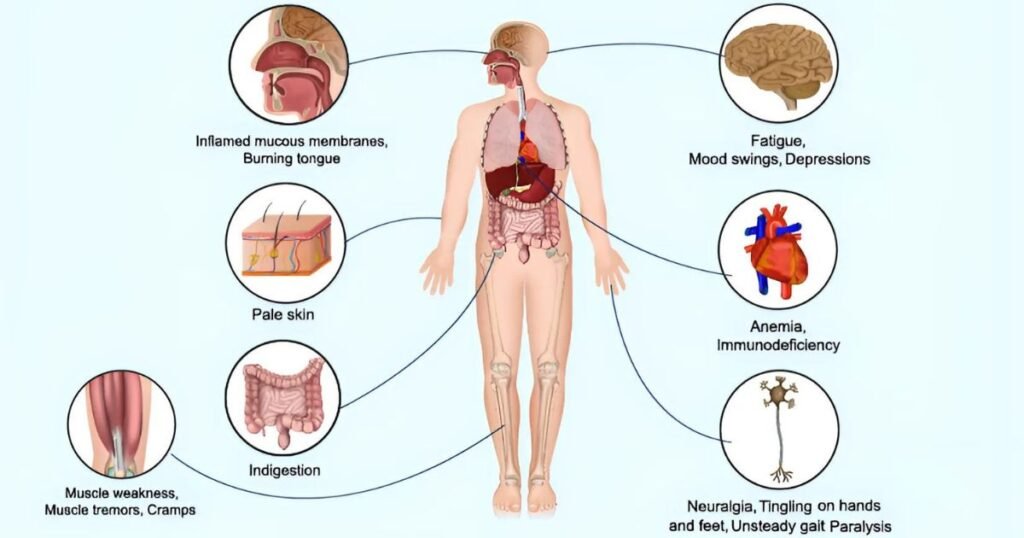Vitamin B12 Deficiency Symptoms occurs when a lack of vitamin B12 causes the body to produce abnormally large red blood cells that cannot function properly. This condition is distinct from folate deficiency anemia, which is caused by a lack of vitamin B9 (commonly called folate).
Red blood cells are responsible for transporting oxygen throughout the body using a substance called hemoglobin. Anemia is a general term for having fewer red blood cells than normal or having an abnormally low amount of hemoglobin in each red blood cell. There are various types of anemia, each with its own cause. For example, iron deficiency anemia occurs when the body lacks sufficient iron.
Read More: Mental Health Human

Vitamin B12 Deficiency Symptoms
Vitamin B12 plays several crucial roles in the body, including maintaining the health of the nervous system. A deficiency in this vitamin can lead to a range of problems, such as:
- Tingling hands or feet  Vitamin B12 deficiency may cause “pins and needles” in the hands or feet. This symptom occurs because the vitamin plays a crucial role in the nervous system. Its absence can cause people to develop nerve conduction problems or nerve damage. In the nervous system, vitamin B12 helps produce a substance called myelin that shields the nerves and helps them transmit sensations. Without sufficient myelin, nerves are more prone to damage. Problems are more common in the nerves in the hands and feet, which are called peripheral nerves. Peripheral nerve damage may lead to tingling in these parts of the body.
- Trouble walking Over time, peripheral nerve damage can lead to movement problems. Numbness in the feet and limbs may make it hard for a person to walk without support. They may also experience muscle weakness and diminished reflexes.
- Pale skin A vitamin B12 deficiency can lead to pale skin and yellowing of the skin, called jaundice. These changes in skin color can develop when a person’s body is unable to produce enough red blood cells (RBCs). Without enough RBCs, the skin may look pale. Vitamin B12 plays a role in the production of red blood cells. A vitamin B12 deficiency can cause a lack of RBCs, or megaloblastic anemia, which has an association with jaundice. This type of anemia can also weaken RBCs, which the body then breaks down more quickly. When the liver breaks down RBCs, it releases bilirubin. Bilirubin is a brownish substance that gives the skin the yellowish tone that is characteristic of jaundice.
- Fatigue Megaloblastic anemia due to vitamin B12 deficiency may lead to a person feeling fatigued. Without enough RBCs to carry oxygen around their body, a person can feel extremely tired.
- Fast heart rate A fast heart rate may be a symptom of vitamin B12 deficiency. The heart may start to beat faster to make up for the reduced number of RBCs in the body. This response is the body’s way of trying to ensure that enough oxygen circulates through all of the body’s systems and reaches all the organs.
- Shortness of breath Anemia that results from a vitamin B12 deficiency may also cause a person to feel short of breath. This relates to a lack of RBCs and a fast heartbeat. Anyone who is experiencing real difficulty breathing should see a doctor straight away.
- Mouth pain A vitamin B12 deficiency can affect oral health and cause the following mouth problems:
- Glossitis, which causes a swollen, smooth, red tongue
- Bad taste in the mouth
- A burning sensation in the mouth These symptoms occur due to a reduction in RBC production, which results in less oxygen reaching the tongue.
- Problems thinking or reasoning Vitamin B12 deficiency may cause problems with thinking, which doctors refer to as cognitive impairment. These issues include difficulty thinking or reasoning and memory loss. Some evidence suggests a link between low vitamin B12 levels to a higher risk of dementia, Alzheimer’s disease, and Parkinson’s disease. The reduced amount of oxygen reaching the brain might be to blame for the thinking and reasoning problems.
- Mental health problems Being deficient in vitamin B12 can affect a person’s mood and may lead to mental health problems. For example, a 2020 review notes a link between vitamin B12 deficiency and depression, suggesting low levels increase the risk of developing depression.
When to See Your Doctor
If you suspect you may have a vitamin B12 deficiency, it’s important to consult your doctor. These conditions can often be diagnosed based on your symptoms and the results of a blood test. Early diagnosis and treatment are crucial because, although many symptoms improve with treatment, some problems caused by the condition can be irreversible.
Causes of Vitamin B12 Deficiency
Several issues can lead to a vitamin B12 deficiency, including:
- Pernicious anemia: This occurs when your immune system attacks healthy cells in your stomach, preventing your body from absorbing vitamin B12 from the food you eat. It is the most common cause of vitamin B12 deficiency in the UK.
- Dietary deficiency: Although uncommon, a lack of vitamin B12 in your diet can occur if you follow a vegan diet, a fad diet, or have a generally poor diet for a prolonged period.
- Medication: Certain medications, such as anticonvulsants and proton pump inhibitors (PPIs), can affect how much vitamin B12 your body absorbs.
Vitamin B12 deficiency is more common in older people, affecting around 1 in 10 people aged 75 or over and 1 in 20 people aged 65 to 74.
Treating Vitamin B12 Deficiency Anemia
Most cases of vitamin B12 deficiency can be easily treated with injections or tablets to replace the missing vitamins. Vitamin B12 supplements are usually given by injection initially. Depending on whether your B12 deficiency is related to your diet, you may require B12 tablets between meals or regular injections. These treatments may be needed for the rest of your life.

In some cases, improving your diet can help treat the condition and prevent it from recurring. Vitamin B12 is found in meat, fish, eggs, dairy products, yeast extract (such as Marmite), and specially fortified foods.
Complications of Vitamin B12 Deficiency Anemia
Although uncommon, vitamin B12 deficiency (with or without anemia) can lead to complications, particularly if you’ve been deficient for some time. Potential complications include:
- Problems with the nervous system
- Temporary infertility
- Heart conditions
- Pregnancy complications and birth defects
Adults with severe anemia are also at risk of developing heart failure. Some complications improve with appropriate treatment, but others, such as problems with the nervous system, can be permanent.
For more information, visit Knowledge Galaxy to learn about the symptoms, diagnosis, causes, and treatment of vitamin B12 deficiency anemia.
Conclusion:
Vitamin B12 deficiency anemia is a serious condition that can lead to a wide range of symptoms, from fatigue and pale skin to more severe issues like nerve damage and cognitive impairment. Early diagnosis and treatment are crucial to prevent long-term complications. If you suspect you may have a vitamin B12 deficiency, it’s important to consult your doctor for a proper diagnosis and appropriate treatment. Maintaining a balanced diet rich in vitamin B12 and following your doctor’s advice can help manage and prevent this condition.
Read More: Vitamin B12 Deficiency Symptoms
FAQs:
Q: What are the main symptoms of vitamin B12 deficiency?
A: The main symptoms of vitamin B12 deficiency include extreme tiredness, lack of energy, pins and needles (paresthesia), a sore and red tongue, mouth ulcers, muscle weakness, disturbed vision, psychological problems such as depression and confusion, and problems with memory, understanding, and judgment.
Q: How is vitamin B12 deficiency diagnosed?
A: Vitamin B12 deficiency is typically diagnosed through a blood test that measures the levels of vitamin B12 in your body. Your doctor may also perform other tests to rule out other conditions and confirm the diagnosis.
Q: What are the main causes of vitamin B12 deficiency?
A: The main causes of vitamin B12 deficiency include pernicious anemia (an autoimmune condition that affects vitamin B12 absorption), dietary deficiency (especially in vegan or poor diets), and certain medications that interfere with vitamin B12 absorption, such as anticonvulsants and proton pump inhibitors (PPIs).
Q: How is vitamin B12 deficiency treated?
A: Vitamin B12 deficiency is usually treated with injections or tablets to replace the missing vitamins. In some cases, improving your diet can help treat the condition and prevent it from recurring. Vitamin B12 is found in meat, fish, eggs, dairy products, yeast extract (such as Marmite), and specially fortified foods.
Q: What are the potential complications of vitamin B12 deficiency?
A: Potential complications of vitamin B12 deficiency include problems with the nervous system, temporary infertility, heart conditions, pregnancy complications, and birth defects. Adults with severe anemia are also at risk of developing heart failure. Some complications improve with appropriate treatment, but others, such as problems with the nervous system, can be permanent.
Q: Can vitamin B12 deficiency be prevented?

A: Vitamin B12 deficiency can often be prevented by maintaining a balanced diet rich in vitamin B12. For individuals at higher risk, such as those with pernicious anemia or certain dietary restrictions, regular monitoring and supplementation may be necessary. Always consult your doctor for personalized advice.






